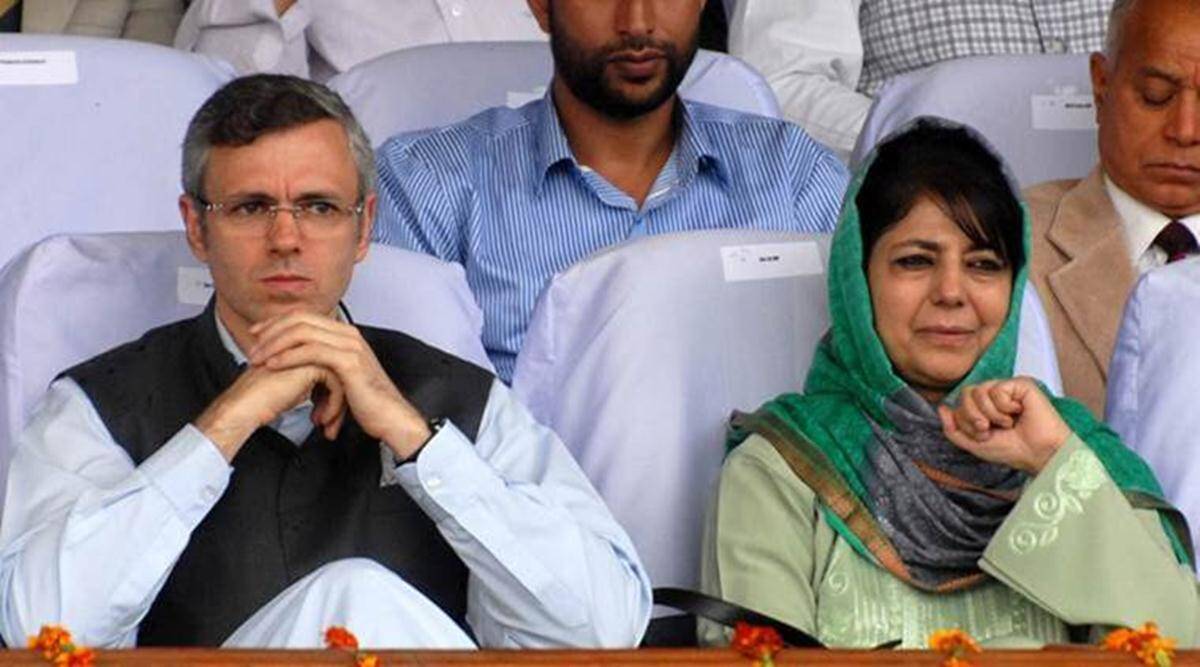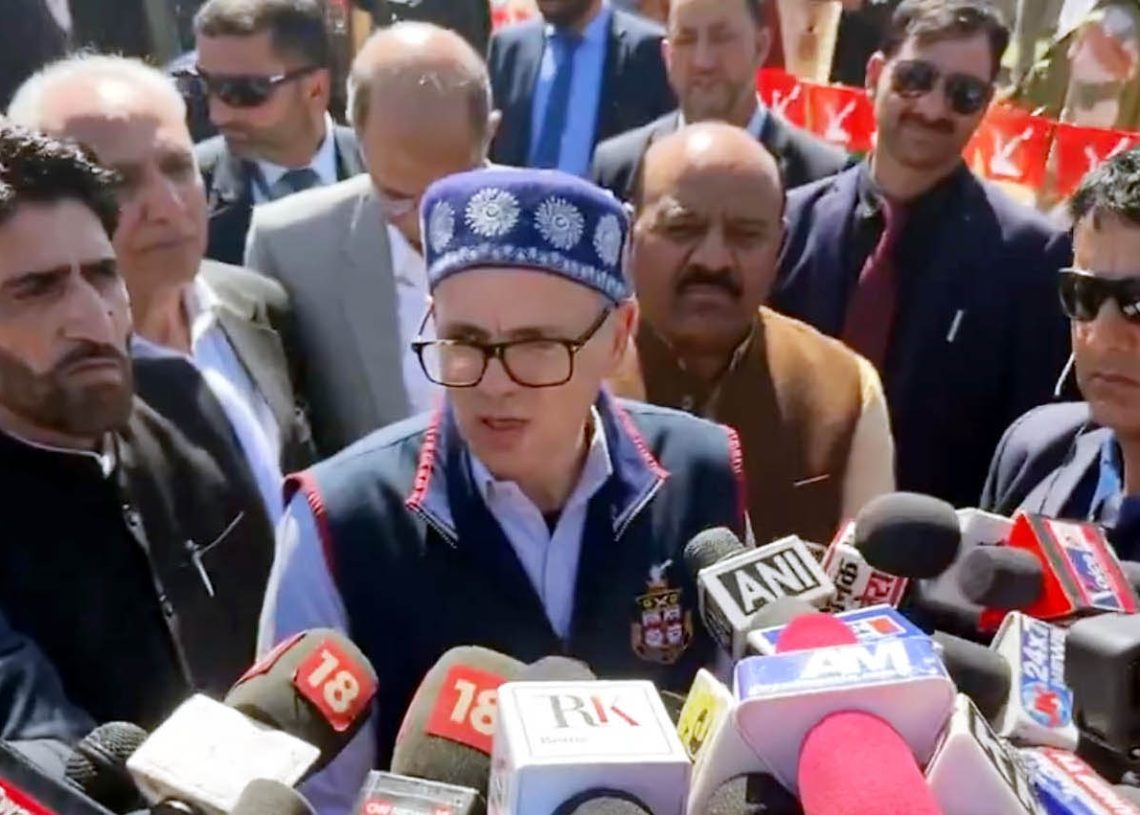Mehbooba Mufti, Omar Abdullah Trade Barbs as Kashmir’s Political Blame Game Heats Up Before Budgam Bypolls
By: Javid Amin | 10 November 2025
As old rivals reignite their feud ahead of the Budgam bypolls, Kashmir’s electorate watches with growing frustration — caught between political egos and unfulfilled promises.
With the Budgam bypolls fast approaching, the familiar script of political blame and counterblame has returned to the Kashmir Valley.
Two of its most influential leaders — Mehbooba Mufti of the PDP and Omar Abdullah of the National Conference (NC) — are once again sparring publicly over who bears responsibility for the region’s turmoil.
While the rhetoric grows sharper, Kashmir’s voters are left wondering whether any party truly intends to address their pressing realities — joblessness, alienation, and uncertainty.
Mehbooba’s Counterattack: “Omar Should Look Within”
In a fiery statement at a party rally in Budgam, Mehbooba Mufti accused Omar Abdullah of “blaming others to hide his own failures”, after the NC leader charged the PDP-BJP alliance with sowing instability in Jammu & Kashmir.
“Omar Abdullah conveniently forgets that many of today’s problems began under the National Conference’s watch,” Mehbooba said, urging him to “stop rewriting history.”
She asserted that political mismanagement and central interference predate her coalition with the BJP, calling the PDP-NC rivalry an “unproductive blame cycle that only hurts Kashmiris.”
Mehbooba also renewed her demand for the reopening of historic trade and travel routes — including the Srinagar-Muzaffarabad road — saying J&K has been “locked in a cage” due to years of political short-sightedness.
“We need to open doors, not keep locking Kashmir in isolation for political convenience,” she said, emphasizing regional connectivity as key to restoring dignity and economy.
The PDP president further accused Omar of remaining silent during controversial episodes — such as mass job terminations and PSA (Public Safety Act) arrests — which she claimed originated under NC-led governments.
Omar’s Rebuttal: “PDP Paved the Road to Article 370’s End”
Omar Abdullah responded with characteristic sharpness, asserting that Mehbooba’s 2015 alliance with the BJP “set the stage for the destruction of Jammu & Kashmir’s autonomy.”
“It was Mehbooba’s government that legitimized the BJP’s entry into Kashmir’s power structure — the consequences of which every Kashmiri now bears,” Omar said while addressing a youth gathering in Chadoora.
The NC vice president accused Mehbooba of failing to apologize for the 2016 unrest, during which more than a hundred civilians were killed in protests following militant commander Burhan Wani’s death.
He further claimed that PDP’s tenure enabled policies such as GST and the SARFAESI Act, which “undermined Kashmir’s financial independence and eroded its special status long before August 5, 2019.”
“They lit the fire, and now they pretend to be firefighters,” Omar quipped, in one of his strongest remarks during the ongoing campaign.
Caught in the Crossfire: The Common Kashmiri’s Fatigue
Amid the war of words, ordinary Kashmiris appear largely disillusioned.
Across Budgam and adjoining districts, voters voice skepticism and frustration, describing the bypoll as “another cycle of promises that will change nothing.”
“Every election brings the same slogans — Article 370, autonomy, or alliance politics. None of them talks about jobs or power cuts,” said Aqib Ahmad, a local graduate struggling with unemployment.
The valley’s unemployment rate remains among the highest in India, with official estimates hovering around 18–20%. The youth, particularly those under 30, continue to grapple with joblessness, shrinking opportunities, and a sense of political abandonment.
Developmental projects remain stalled or incomplete, while tourism and agriculture, once pillars of the local economy, have failed to create stable livelihoods post-2019.
Observers note that both PDP and NC have failed to rebuild public trust since the region’s conversion into a Union Territory, often reverting to rhetoric instead of policy vision.
Analysts’ Take: An Election Driven by Rhetoric, Not Reform
Political observers believe the renewed verbal duel between Mehbooba and Omar signals a larger power struggle — not just over Budgam, but over the future of Kashmir’s mainstream politics.
“Both leaders are fighting for relevance in a post-Article 370 landscape where Delhi holds the real levers of power,” said political analyst Dr. Aijaz Rather.
“Unfortunately, their debate is more about history than about hope.”
Analysts argue that without a clear development roadmap, such blame games risk deepening voter alienation.
The Road Ahead: Promises or Political Theatre?
As Budgam heads toward the bypoll, the outcome may not just determine a seat, but the direction of Kashmir’s mainstream narrative.
If Mehbooba’s “reconciliation and reopening” pitch gains traction, it could revive PDP’s grassroots relevance.
If Omar’s “accountability and restoration” narrative resonates, NC may reassert itself as the valley’s political heavyweight.
For now, the political noise grows louder, while the common Kashmiri waits quietly — for jobs, for stability, and for leadership that delivers beyond words.


